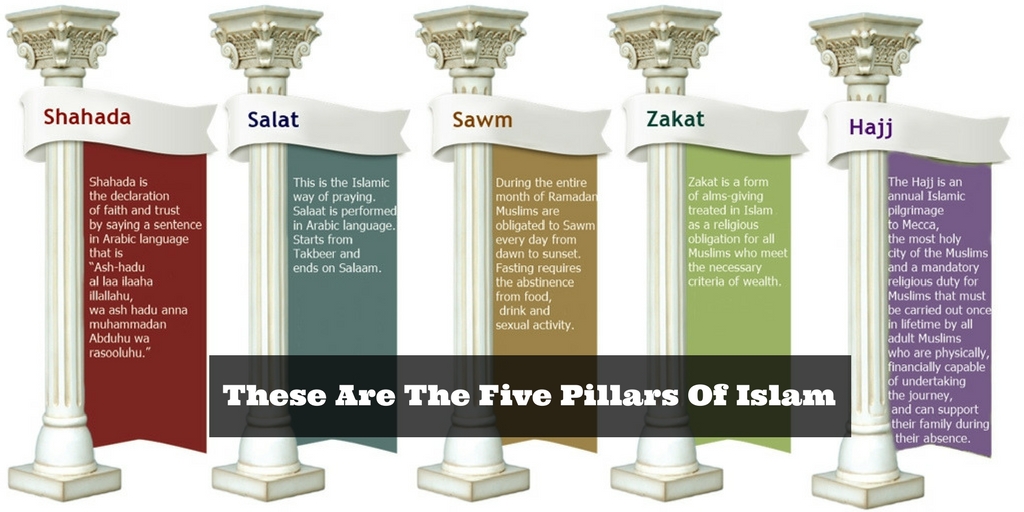The Five Pillars Of Islam
The Shia , Ahmadiyya , and Sunni agree on the essential details for the performance and practice of these acts, [5] [6] but the Shia do not refer to them by the same name see Ancillaries of the Faith , for the Twelvers , and Seven pillars of Ismailism. They make up Muslim life, prayer, concern for the needy, self-purification, and the pilgrimage, [7] [8] if one is able.
Shahada is a declaration of faith and trust that professes that there is only one God Allah and that Muhammad is God's messenger. Salah consists of five daily prayers according to the Sunna; the names are according to the prayer times: The Fajr prayer is performed before sunrise, Dhuhr is performed in the midday after the sun has surpassed its highest point, Asr is the evening prayer before sunset, Maghrib is the evening prayer after sunset and Isha is the night prayer.
All of these prayers are recited while facing in the direction of the Kaaba in Mecca and form an important aspect of the Muslim Ummah.
Pillars of Islam
Muslims must wash before prayer; this washing is called wudu "purification". The prayer is accompanied by a series of set positions including; bowing with hands on knees, standing, prostrating and sitting in a special position not on the heels, nor on the buttocks. A Muslim may perform their prayer anywhere, such as in offices, universities, and fields. However, the mosque is the more preferable place for prayers because the mosque allows for fellowship.
The principle of knowing that all things belong to God is essential to purification and growth. It is the personal responsibility of each Muslim to ease the economic hardship of others and to strive towards eliminating inequality.
A Muslim may also donate more as an act of voluntary charity sadaqah , rather than to achieve additional divine reward. Three types of fasting Siyam are recognized by the Quran: Ritual fasting, [15] fasting as compensation for repentance both from sura Al-Baqara , [16] and ascetic fasting from Al-Ahzab.
Five Pillars of Islam
Ritual fasting is an obligatory act during the month of Ramadan. The fast is meant to allow Muslims to seek nearness and to look for forgiveness from God, to express their gratitude to and dependence on him, atone for their past sins, and to remind them of the needy. In addition, all obscene and irreligious sights and sounds are to be avoided.
- Daisy Miller (Modern Library Classics)?
- An Oresteia: Agamemnon by Aiskhylos; Elektra by Sophokles; Orestes by Euripides?
- Ring Of Truth!
- Cookies on the BBC website.
- Die Legenden der Albae: Vernichtender Hass (Die Legenden der Albae 2) (German Edition).
- Life Sciences and Radiation: Accomplishments and Future Directions.
- Keep Exploring Britannica.
Fasting during Ramadan is obligatory, but is forbidden for several groups for whom it would be very dangerous and excessively problematic. These include pre-pubescent children, those with a medical condition such as diabetes , elderly people , and pregnant or breastfeeding women.
On this page
Observing fasts is not permitted for menstruating women. Other individuals for whom it is considered acceptable not to fast are those who are ill or traveling. Missing fasts usually must be made up for soon afterward, although the exact requirements vary according to circumstance.
- What we do;
- Cookies on the Muslim Aid Website!
- A Certain Music;
The Hajj is a pilgrimage that occurs during the Islamic month of Dhu al-Hijjah to the holy city of Mecca. Every able-bodied Muslim is obliged to make the pilgrimage to Mecca at least once in their life. Both men and women are required to make the pilgrimage to Mecca. The pilgrim , or the haji , is honoured in the Muslim community. It must be recited by every Muslim at least once in a lifetime, aloud, correctly, and purposively,….
The five pillars Muhammad In Muhammad: Biography according to the Islamic tradition Ramadan importance In Ramadan. Help us improve this article! Contact our editors with your feedback. You may find it helpful to search within the site to see how similar or related subjects are covered.

Any text you add should be original, not copied from other sources. At the bottom of the article, feel free to list any sources that support your changes, so that we can fully understand their context. Internet URLs are the best. Thank You for Your Contribution! There was a problem with your submission. Please try again later.
Keep Exploring Britannica Zoroastrianism. Zoroastrianism, the ancient pre-Islamic religion of Iran that survives there in isolated areas and, more….
The Five Pillars of Islam are five basic acts in Islam, considered mandatory by believers and are the foundation of Muslim life. They are summarized in the. The Five Pillars of Islam are five basic rules in Islam that all Muslims should follow. The Five Prayer (Salah) - Praying five times a day, kneeling towards Mecca.